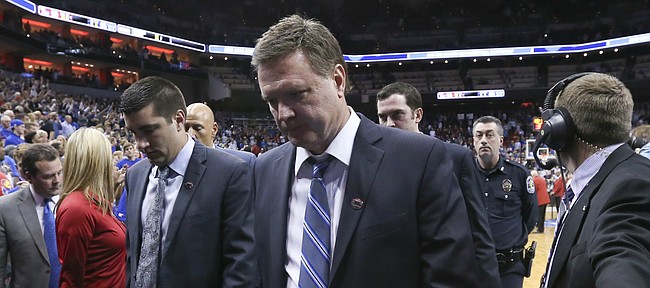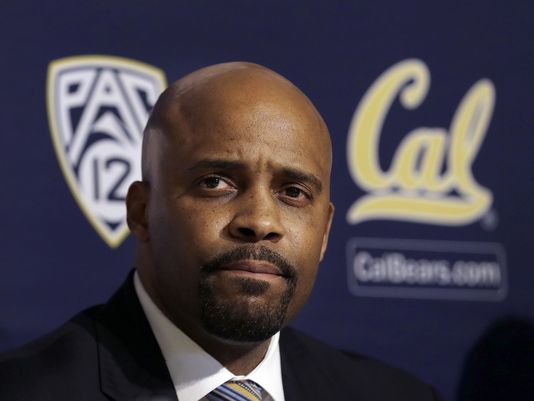The South Region witnessed a ferocious Elite Eight game on Saturday, as Villanova subdued Kansas in a street fight to make the second Final Four of the Jay Wright era.
Instant reaction at partner site The Comeback can be found here. An on-site report by Michael Grant of The Comeback can be found here. Those two pieces will cover the South Regional final.
In this piece, we’ll look at the edges of that game, but also review the past two weeks of action in this quadrant of the NCAA tournament bracket.
A first point to make is that much as Oklahoma’s nucleus — Buddy Hield, Isaiah Cousins, Jordan Woodard, and Ryan Spangler — has started 104 games together, Villanova’s core was similarly battle-hardened. Ryan Arcidiacono, Josh Hart, and Daniel Ochefu — all upperclassmen in their own right — had logged many miles and endured NCAA tournament defeats together. They were sick and tired of being sick and tired.
The extent to which they competed and defended — relative to past March flameouts — was noticeable on Saturday. The extent to which Ochefu developed his low-post game, relative to 2015, was conspicuous. These players made themselves so much better this March, and that improvement — much like Buddy Hield’s evolution from very good player to transcendent, generationally memorable player at OU — made the difference between a disappointing NCAA tournament and a spot in the Final Four.
Duke won with a one-and-done model last year. Kentucky did the same three years earlier and very nearly went 40-0 last season under the same context (albeit with some help from second-year players and upperclassmen). With Villanova, tested seniors — sticking it out with a program and coach Jay Wright — gave a team its most central Final Four resource.
The taste of victory — for the coach and his players — is always especially sweet upon crossing that Final Four threshold. When a coach is able to share the joy of the moment with seniors, the combined feeling of relief and accomplishment is that much more acute.
Wright. Arch. The Chef.
A coach and his best seniors now have a shared memory of a lifetime. That’s the best of college sports, the classic portrait of what this theater of competition can do to tug at the ol’ heartstrings.
Speaking of that…
We’ve all witnessed (if we’re 20 years old) hundreds of NCAA tournament games — thousands if in our 30s. If you’re reading this, you’ve had quite a lot of experience at watching March Madness contests.
Every game is its own unique beast. Some games clearly live in the public memory as instances of free throws turning the tide — North Carolina State-Houston in 1983. Some games obviously stand out as examples of player gaffes telling the tale — Fred Brown’s pass to James Worthy at the end of Georgetown-North Carolina in 1982. Some games are classics in which a great player made a great play… and the opposing coach could have done something to increase the likelihood of success, but shouldn’t be saddled with sole responsibility for the outcome. Yes, we’re thinking of Christian Laettner making an unreal shot at the end of Duke-Kentucky in 1992… but Rick Pitino should have guarded Grant Hill on the inbound pass.
Every game is its own entity, to be evaluated on its own terms. Coaches do have track records and reputations, and said reputations are established based on certain patterns.
Goodness knows, Bill Self has some really bad March losses on his resume: Bucknell, Bradley, Northern Iowa, and VCU most of all. The talent disparities between the Jayhawks and those four opponents put the onus on Self to have created better shot selection or more (read: longer) pressure defense, or both. Self really failed in those four games, much as Roy Williams failed from 1995 through 1998 in situations when Kansas had better talent than its opponents in the NCAA tournament (though one could make an exception in 1996 against Syracuse and John Wallace).
Again, Bill Self has had to wear a number of March losses, putting on the sackcloth and ashes of misery after nights when he just didn’t have his fastball.
Let’s briefly stop for a moment and consider what we just witnessed against Villanova on Saturday: Would you say that after having watched hundreds if not thousands of NCAA tournament games over the years, that loss is on Self more than his players?
Before answering, keep in mind that Perry Ellis scored 4 points. Wayne Selden and Frank Mason combined to go 1 of 12 from 3-point range. Brannen Greene, the shooter Kansas had hoped would make a difference in March, was injured and unavailable. The Jayhawks committed eight turnovers in a series of nine first-half possessions, often due to a simple failure to be strong with the ball.
KU lost by only five points through sheer force of will and determination.
I know coach-caused losses. Coach-caused losses are friends of mine.
Senator Villanova-Kansas, you’re no coach-based loss.
This particular debate isn’t even remotely close.
If you think Bill needs another Self-help coaching manual after this game, you’re full of beans.
Now, to other notes from the South Region:
This coach is in a heap of trouble.
Cuonzo Martin’s uncertain role (degree of centrality) in the Yann Hufnagel scandal has begun to negatively affect recruiting. That the Golden Bears couldn’t win even one NCAA tournament game — even though two core players were either injured or ill — deprived the program and the Pac-12 of a win share and added revenue. It removed a lot of the luster from a solid though hardly spectacular season.
Martin went to Berkeley in search of a more peaceful life, and less of the withering scrutiny which made him choose to leave Tennessee even after he made the Sweet 16 with the Vols in 2014. That freedom from scrutiny is gone, and worse, it could soon create a situation that’s untenable for him. It’s not an exaggeration to say Cuonzo’s coaching career exists in a state of potential crisis.
*
Compared to Cuonzo, other South Region coaches aren’t in bad shape. Yet, their identities are very much hard to pin down.
Maryland regularly played hard against top-shelf competition, but unceasing effort — regardless of opponent — proved to be elusive for the Terps this season. Mark Turgeon didn’t whiff at Maryland this year — his team went down swinging against Kansas in the Sweet 16, dying a noble death. However, this team was certainly talented enough to land a top-2 or at least a top-3 seed, creating a bracket path which could have ushered the Terps into the Elite Eight at worst, possibly the Final Four.
Turgeon couldn’t really do much about Melo Trimble’s jumper breaking down. He also gets something of a break for Robert Carter’s erratic play — coaches should get more criticism for failing to coach their own recruits as opposed to transfers such as Carter. Yet, even if one gives Turgeon a break for that example — which is appropriate — he still hasn’t proved that he’s ready to deliver high-end results at a high-end program. If there’s an indication Turgeon can make Maryland into “Gary-Land” again, we didn’t see it in the 2016 South Region.
*
Another coach who is hard to pin down? Kevin Ollie of Connecticut. On one hand, the Huskies got hot in March, winning the AAC Tournament and their 8-9 game against Colorado. On the other hand, UConn struggled for much of the season and should not flirt with 8-9 games. This is a program which should be a top-4 seed, based solely on pedigree alone. If the next three seasons put UConn in an 8-9 game, fans would have a right to be displeased. This season was okay in Storrs, but the Huskies are not supposed to be content with “okay.”
*
Arizona just didn’t have the depth or dynamism to be a force this season. That happens. Arizona’s fall from a place of prominence in 2016 magnifies the ability of Bill Self to simply never have a particularly big drop-off with Kansas. Arizona should be back next season. Sean Miller is too good to not make a Final Four.
*
Yes, Miami got blown out by Villanova, but the Hurricanes have never made the Elite Eight in their history. Jim Larranaga has taken The U within one win of that milestone in two of the past four seasons (and NCAA tournaments). In a cutthroat ACC, Coach K and Roy Williams regularly have the best chances to win the national title, but Larranaga and Tony Bennett of Virginia have been the best coaches in the league over the past four seasons.
*
As a final note, keep in mind how cathartic it was for Villanova to get through the first weekend. That was such a pressure-valve release for the Wildcats. Once they got to Louisville for the Sweet 16, they smelled the finish line and defended the basket with a ravenous hunger unmatched by any other tournament team. If Villanova defends this way against Oklahoma, it should find itself in the national title game on April 4.



